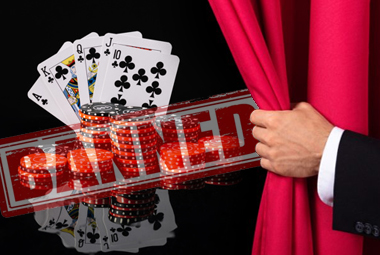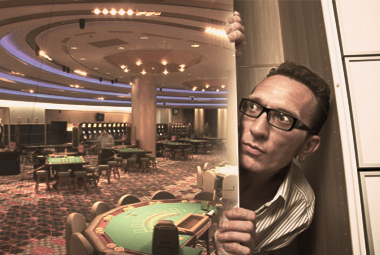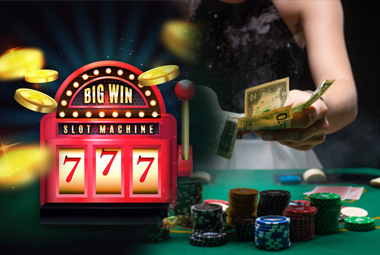INTRODUCTION
When I was thinking of the titles for this five-part series, I decided that I would kind of toss out a little misdirection with this one. I wanted the goal to be a lead-in that made it sound like I was about to take the side of the casinos, but no such thing is happening here.
In fact, we are going to address the casino perspective in this article, but will also be making arguments against the extent that casinos go to with things at the same time. More than that, we are going to discuss all of the positive qualities that make a highly skilled advantage player---well---a highly skilled advantage player.

The main points that we have established in the previous two articles are the following:
- Advantage Players earn money without providing any kind of product or service that anyone wants, with exception to poker players, because of the casino’s rake.
- Advantage Players can be tribalistic in their tendencies.
- Advantage Players can be more protective of some plays than others, as we discovered at the end of Part II, arguably for very good reasons.
- For non-poker advantage plays, the money flows:
Recreational Players--->Casinos--->Advantage Players
Thus far, we haven’t really discussed the casinos very much at all, so that will be one of two primary points of this article. The second point is to make sure we are taking a balanced look at AP’s, which was the intention of this series the entire time.
THE CASINO PERSPECTIVE
The casinos are advantage players.
As Google would have it:
Advantage (n.): A condition or circumstance that puts one in a favorable or superior position.
In fact, it could be argued that the casinos are best at advantage play, despite making mistakes from time to time. What more superior gambling position can one have than offering a negative expectation game, and actually getting throngs of people to come through the door to play it?
We’ve also discussed Tribalism as relates the different groups and subgroups of advantage players, and that Tribalism is no different when it comes to the casinos. Remember our simplified cash flow chart:
Regular Players--->Casinos--->Advantage Players
As we discussed, the casinos would run out of money if there were no regular players and Advantage Players could not exist.
One key difference is that the Advantage Players are fighting a one-front battle, they want to extract money from the casinos. Regular players may also wish to do that, but a key difference is that they gamble in a way such that they are not expected to do so. The casino has a battle on two fronts:
Get the regular players in, keep the Advantage Players out. How far will they go to get the regular players in?

Self-Exclusion & Casino Bans
The casinos often try to have this both ways.
One means by which regular players are purportedly protected (from themselves) is that of self-exclusion. A player who believes he or she has a problem can go up to someone in the casino and request to be barred from the property. Let’s see how well that works.
- Looks like they marketed to one of the players, which they are not allowed to do.
- The second casino to catch a fine first paid out a jackpot to a woman using a Fake ID, which the casino claims is a commission of fraud on her part. The second was when a different self-excluded player was allowed to receive a new players club card.
- Um, so, I guess they thought the second of those two things was not fraudulent? Kind of funny how the word, “Fraud,” gets thrown out on some occasions, but not others, depending on who is doing the alleged frauding.
Here’s another:
In this one, the player had been banned (by the casino) seventeen years prior. She finally hit a jackpot in 2019 and was not permitted to collect due to being on the casino’s banned list.
When she was banned, the banning occurred under her maiden name with social security number provided. She later would marry, at some point prior to this incident and get a players card under her new name. The casino correctly points out that SSN is not required to get a players club card and also that they have no obligation to stop excluded patrons from entering the premises.
As with anything else related to the casinos, it’s their rules when the casino is benefitted, otherwise, screw the rules.
I’m not saying that casinos should be asking to look at social security cards when a patron enters, that would be completely absurd. Here are a few things I am suggesting:
1.) The casino (and gaming) both make it clear that the casino has no obligation to identify banned players and keep them from entering. This is pretty standard policy.
- However, the casinos use this to their advantage...selectively. Most casinos make no effort to stop the patrons whatsoever, whether under a new married name, or otherwise. They can walk in and gamble and an expected loss to their heart’s content, lose any amount of money, but the second it comes time to pay out a jackpot...uh oh.
The point is not that the casino actually HAS a responsibility to make sure that no excluded patrons are gambling, that would be ridiculous. The point here is that they are not even TRYING. It just gives them something else that they can selectively enforce and only when it is to their benefit.
2.) Just pay the damn jackpot!
- The refusal of the casino to pay a mighty jackpot sum of $1,733 proves just how ruthless they can be.
- I’d love nothing more than to see her win/loss statements from her players club card over the years. She has almost certainly lost more than $1,733. Beyond that, the reason for her ban wasn’t even gambling related, they said she had a controlled substance (marijuana, she admitted) in her purse seventeen years ago!
- In this case, it was a casino exclusion, not a self-exclusion. This just shows how shortsighted and idiotic they can be.

17. Years. Later.
My Response: Hello, yes, Mrs. Bean. First, I want to apologize for the delay and inconvenience to you. After we ran your social, it came to our attention that, in 2002, you were banned for having a controlled substance in your purse while on our property. We want to inform you that such is against the rules and request that you not do anything similar in the future.
In any case, we are going to pay you now, and we have removed you from our internal banned list. While we are not saying the reason for your ban was wrong, it has been an awfully long time and we appreciate you being a loyal player. Thank you again and hit another one while you’re here!
- The casino made so much money (I assume) between 2002-2019 off of her before this and would get that $1,733 and more back in probably not very much time at all.
There is also a degree of narrative control that goes back years:
That article is about casinos seizing winnings taking place in 2011, in Atlantic City. Here’s one quote that has always fascinated me:
But the gamblers sneaked inside anyway, gambled, won, and got caught, only to see the casinos seize their winnings. Casinos could be fined each time it happens.
THEY, “SNEAKED IN!!!!”
I’ve been to every casino in Atlantic City at least once, so I can tell you how one goes about, “Sneaking in,” to the casino, here is the list of steps, get ready:
- Walk in the front door.
- Congratulations.
I have never seen a casino in Atlantic City make an attempt to ID anyone who has ever walked on the casino floor, so sneaking in is not exactly hard to do. Not only does that include self-exclusions, but it could also include those who are not of legal gambling age.
Okay, so you have a place with all of these visitors, many tourists, but we’re not going to station all of our entrances to make sure people are, at least, of legal age to gamble.
Why?
- If we want to give the casinos as much credit as possible, they partially do not want to prevent things that are against the law because such prevention would cost more money. Security guards cost money.
- The bigger one is that players generally don’t hit jackpots. With many table games, you almost never have to worry about it. Therefore, if you have a self-excluded individual or a minor in there gambling, it only even becomes a problem if that person hits a jackpot.
Oh no, they hit a jackpot. We care about gambling addiction prevention. We care about self-excluded individuals coming on the property. We care about minors gambling, it’s just that you can’t stop them all.
Well...you can’t stop any of them if you’re actively not trying.
We’ve identified two types of gamblers, so now let’s identify two reasons they wouldn’t want to stop them:
1.) Self-Exclusions: These people have already mostly said that they have a gambling problem. The casinos want people with gambling problems. A not insignificant portion of their profits come from people with gambling problems.
- The fact of the matter is that the self-excluded gamblers, on net, are going to provide for the casino more winnings than the casinos are going to have to pay to the state in fines on those rare instances where they have no choice but to do something about it.
- You could call it a, “Gamble,” or you can call it a cost-benefit analysis, it makes no difference.
2.) The same general concept is the case with minors. On net, they are going to lose more money to the casinos than the casinos are going to pay in fines when they are forced to do something about it.
In either case, they don’t do anything about it because they don’t want to do anything about it.
The whole thing is about narrative control. People are, “Sneaking it,” not, “The casino is enabling people to sneak in by not having even the most minimal of security measures.”
It’s a pile of garbage that everyone buys into because they’re not really involved in gambling, or if they are, they are one of the high-percentage of people who are just casual customers.

Anecdote 86
I’ve been tossed from a few casinos by now, but one interesting thing has happened on two of those occasions:
Obviously, the goal is just to get out of there without getting backroomed and formally trespassed, so I have tried the whole, “I don’t have my ID with me,” twice before. And...what was I told:
“It’s illegal to not have your ID in a casino.”
Both times!!! Both times they said that!!! I don’t know if there is a state in which that is ever correct, but I can tell you that it was just a patent lie on both of these occasions.
Anyway, it’s nothing more than an intimidation tactic, which is their go-to mechanism when it comes to advantage players. It used to be they would just beat the crap out of you, but the authorities have finally made it such that they aren’t really able to get away with that so much. Granted, they are permitted to lie, but why would they?
My counterpoint to the guy was that not only is it NOT illegal, but that if it were, why the hell aren’t they carding people when they come in the door? If it’s something they are so deeply concerned about, then why make no effort whatsoever to do anything about it?
It’s like they’re not even trying. The only thing they are trying to do is intimidate, which is fine. My most recent 86’ing, I was insulting them left and right hoping that maybe I could get one of them to hit me, I like money. It didn’t happen, unfortunately. I won’t go into much detail, but they also referenced a couple other crimes that absolutely did not apply.
One of them was wire fraud, let’s check that definition.
“1) that the defendant voluntarily and intentionally devised or participated in a scheme to defraud another out of money; 2) that the defendant did so with the intent to defraud; 3) that it was reasonably foreseeable that interstate wire communications would be used; and 4) that interstate wire communications were in fact used.”
What?
Nothing had anything even remotely to do with a communications device, and even if it had, it would not have been an interstate communications device. How the hell is playing on a machine an interstate communications device?
How can I, “Defraud,” a casino out of money by playing a game that they are offering? I was no more guilty of wire fraud than any other person winning in that place.
He said wire fraud, I laughed and said, “I bet you say that to all the boys, don’t try to flatter me.”
---The point is, the casino does absolutely nothing to prevent certain crimes from occurring because they benefit from those crimes. In many cases, they put precisely no measures in place to prevent those crimes from taking place.
---But, when an advantage player is doing something that they don’t like, they’ll just make up brand new definitions for crimes as an intimidation tactic. They want to scare away the players who find a way to win that is not on their terms, and they hope the word will spread so that other advantage players are not inclined to find ways to win.
Well, here I am spreading the word, and the word is this: **** you.
Let me be clear that doesn’t go for everyone. There are many casinos staffed by some pretty cool people, (especially at the ground level) and I imagine there are a few casinos out there staffed by only reasonably cool people.
I think, when it comes to selective attitudes towards the law and attitudes towards advantage players, those attitudes are nothing more than a culture that starts from the top. At the casino in question, I imagine the HELP WANTED for Security Supervisor looked something like this:

HELP WANTED:
Position: Security Supervisor
Salary: Sucks
QUALIFICATIONS: Were you bullied in High School? Do you hate the world? Did you maybe think you had a shot at an NFL career but got, “Injured,” during college and had that shelved...or maybe you just weren’t that good?
If the answer to any of these questions is, “Yes,” then we have just the position for you!
As a casino Security Supervisor, you will be able to instill a misguided sense of, “Ethics,” into your underlings. We provide a salary that is not particularly good that can be traced back to peoples’ disability checks, so the source should at least make you happy.
More than that, if anyone actually figures out a way to beat us, it will be your responsibility to intimidate them by any means available to you, only stopping short of physically assaulting them. Remember, the money from addicts, degenerates, minors and those self-excluded belongs to us.
Unfortunately, you will occasionally have to enforce the law when it doesn’t help us. The good news is that many people out there think that, “Card counting,” is illegal, not to mention lesser-known exploits, so we already have the public fundamentally on our side! Every once in a while, you may have to pretend to actually care about those with gambling problems and make excuses for us. Don’t worry, this doesn’t happen often, we have the advantage of people believing what would normally be true with other businesses: If we are throwing them out, they must have done something wrong.
ADDITIONAL QUALITIES: Righteous indignation. General sanctimoniousness. Hypocrisy is not required, but strongly recommended.
More Hypocrisy
Here’s an article about a major advantage play involving Phil Ivey:
You should give that one a read if you haven’t.
The short story is that the casinos wanted to cater to Phil Ivey, a well-known professional poker player, in order to get him to play some high-limit Baccarat.
Phil Ivey requested that the casino make a number of concessions that resulted in a game that was favorable to him. What a surprise that a professional gambler would want that. The casino made the concessions, completely of their own volition. If you want to read more about that, just click on the article.
To the surprise of nobody at all except the casinos, they took an absolute beating due to the circumstances that they intentionally put into place. So, they sued him, and won.
All that Phil Ivey did was influence the terms under which the gambling was conducted so that he would be at an advantage, and therefore, expected to win.
The rake at poker, slot machines, bingo, sports betting, most video poker games, table games...they all do the exact same thing to 99.9% of players every day. They control the terms to put themselves at a mathematical advantage.
The casinos are advantage players.
And, that’s okay, as far as they are concerned. It’s okay as far as I am concerned. It’s okay as far as most players are concerned. It’s okay as far as most Advantage Players are concerned…
Except when it is a different advantage player doing it.

Clientele
When a casino creates a set of circumstances by which an advantage player is expected to win, with exception to cheating, one truth that a lot of people miss is that anyone could theoretically do it.
For example: Anyone that goes up to a variable state slot machine when it is at an advantage and takes a spin is at an advantage for that spin. People unwittingly do this all the time.
Promotions and anything else all operate the same way. Absent cheating, the same set of conditions is available to everyone to do with as they like.
The casinos do some of these things (not all) in an effort to create a demand for players. Even with the machines, features are introduced to encourage players to put more money into the machine after they have lost…...that’s literally the point of variable state machines.
If the value of the situation seems somewhat obvious, that’s because it is meant to be obvious. They want a player who has lost to perceive the value of a situation so that the player will be inclined to keep playing. The difference between that player and an Advantage Player is that the Advantage Player stops when the value does.
Must-hit machines, and really, any machine with a progressive is designed to do the same thing: Create the perception of value. “Holy cow! The progressive on that other machine is only at $7,000, but this one on the same machine is at $11,000, this one must be good to play!”
In most of these cases, the regular player is wrong. That is why the regular player is accepted unquestioningly. The goal is for them to be wrong.
But, rarely, the regular player is right. The Advantage Player is usually right.
The ideal set of conditions (for the casino) is to create a situation that gives the appearance of positive value whilst actually not offering any value at all. That’s the goal of a promotion, for example. In the course of attempting to do that, the casino will often provide actual value, or what I will call conditional value, the condition being knowing how to play it.
And, when they do offer value, sometimes they’ll even simply take it away as we see here:
They sometimes say, “Screw it, we’ll just cheat.”
I said there was no casino demand for Advantage Players in Part I, but that is not the full truth of the matter. By demanding regular players, and creating conditions by which those players might be enticed, they also entice the Advantage Players.
The difference is that the consequences of enticing the first are desired whereas the consequences of enticing the second are not.
What, then, is the casino perspective?
We have the right to make money. Advantage Players DO NOT have the right to make money, even if we are putting into place the conditions that might cause that to happen.
Positive Qualities of Highly-Skilled Advantage Players
1.) Creativity
- Highly-skilled advantage players who figure out their own plays rather than learning and copying an already used formula are highly creative.
- There are any number of situations in a casino that might appear not to be favorable to anyone, but a highly-skilled advantage player looks at every machine, every promotion and every other set of circumstances as a problem to be solved.
- They ask themselves, “How can I use this to make money?” “Is there any value to be found in this situation?”
- In answering those questions, they have to engage in multi-step problem solving and consider every possibility available to them. More than crunching numbers, they often have to look at whole entire situations from different, “Angles,” in order to find potential exceptions.
- If a person said to me, “You will always lose on slot machines.” I’m not going to challenge that position at all. There are a few reasons for that:
1.) Them continuing to believe that benefits me.
2.) If they use this perceived information to draw a conclusion, then that conclusion will either be to not gamble at all or not to gamble for anything other than entertainment.
- Both of those are very healthy attitudes. Gambling addiction happens when people start to think, “I’m due for a win,” or, “Sooner or later, I have to go on a hot run.”
- If a person, early on in their gambling life, can understand that they are probably going to lose and are expected to do so, then that person will be more likely to control his/her gambling. It is for that reason that most gamblers are not gambling addicts.
- There’s an old axiom, “Losing is only the second-worst thing that can happen to a first-time gambler,” I think that says everything.
- I don’t write anything to encourage people to gamble. I can’t remember a time where I have gone to someone who never gambles and said, “Hey, let’s go to the casino.” What I write is designed for those already with an interest in gambling.
- Therefore, if a person is not inclined to gamble because they assume that there is literally no way to be expected to win--Awesome. Continue to believe that, because for most people, that’s going to be a much safer notion to have (and is closer to the truth) than thinking that casinos are beatable.
3.) It’s usually true anyway. I would say that a full 75% of machines on the floor of most casinos, just talking about the machines themselves, can absolutely not be beaten under any circumstances. Of the other 25%, the vast majority are such that opportunities are extremely rare, not particularly valuable, or both. Same goes with table games.
***But, a good advantage player is creative. And a great advantage player:
2.) Logical Intelligence
That doesn’t mean that they are all great at math. I love Axelwolf, but a math expert he is not.
What Axelwolf IS, as with most great Advantage Players, is a problem solver. He doesn’t look on a casino floor and see gambling games, he looks on the casino floor and sees problems that are there to be solved.
It requires tremendous logical intelligence to even see these things as problems with solutions as opposed to, “It’s a casino machine, you’re going to lose.” It takes even greater logical intelligence to actually solve those problems.
So, they solve the problems. Sometimes, they might even hint at how to approach a problem.
But, it’s understandable that they want to protect information gained by way of their deductive capabilities---who wouldn’t? If you want to do it, then you have to solve the problems yourself, and some people resent that they should have to do that. Other people think it’s not possible. Still others think it is not worth doing. A few think it’s underhanded (and the casinos aren’t underhanded!?)
The point is, it’s a unique means of income that not every person is capable of discovering for themselves. Not a high school algebra book where the answers to the odd numbered problems are supposed to be there in the back for all to see.
3.) Independence
Great advantage players don’t do advantage play because they couldn’t, “Get a regular job.” They do it because they don’t want a regular job. They could most definitely get a regular job if they wanted to.
But, they want to find a way to earn money that they think is unique and interesting. More than that, they want to do it in a way such that they don’t have to answer to anyone, with exception to each other. They don’t want to have a boss. And, I imagine that they may not have the precise skill set required to own a business (though some of them might), or that they just don’t want to.

Conclusion
In the first article, I correctly pointed out that Advantage Play, when a profession, is a profession that is not in demand as it does not provide a product or service to anyone. Some people took that as an insult or a slander as to their ethics...but it wasn’t.
Advantage play (other than casinos) is ethically neutral.
I also think that is true for the casinos, in most cases. A high majority of the time, the customer goes in expecting to lose, gets entertained playing the games (win or lose) and leaves. The customer is generally of legal age and does not have a gambling problem.
In other cases, the casinos behave in a way that is patently unethical, such as selective enforcement of the rules. Other advantage players couldn’t behave unethically in this way even if they wanted to, because there are no rules there to be enforced. An ethical failure is intentionally allowing something that is wrong to take place:
- Not doing more to prevent problem gambling is wrong.
- Enforcing the banned policies only when they benefit you is wrong.
- Threatening people for supposed legal charges when their behavior does not violate the law is wrong.
And, pitching a fit because there are a handful of people out there who can play your game even better than you do is hypocritical and laughable.
Look out for:
Part IV: Darkoz-The Man Behind The Mask
Part V: The Future of the Tribes
Comments
I too marvel at how the media tend to put a spin on any story coming out of the casinos, to put the casinos in the best light possible. As you know I have looked at the casino credit system and the way it operates, and there is much to shake your head about. But if, say, a professional athlete gets into trouble the media will unfailingly follow suit and proclaim " he wrote bad checks" [technically correct only] and go ahead and totally absolve the casino who has been greedily taking advantage of a vulnerable person.
You have to love the bias! I think a good example of exactly that happened at JACK Casino Cleveland when it used to be called Horseshoe. I don't recall who the former athlete was, but I do recall writing an article about it or maybe it was in a News & Notes.
I can't help but wonder how the media gets bought, in this regard. Certainly it shouldn't hurt them to publish a more objective appraisal unless money is changing hands, right? Hell, if anyone should have a pro-casino bias, it should be us...but if something even an online casino is doing sucks, I'll call it out without a second thought.
I read all this to learn
Thank you
On the contrary, thank you for reading!



